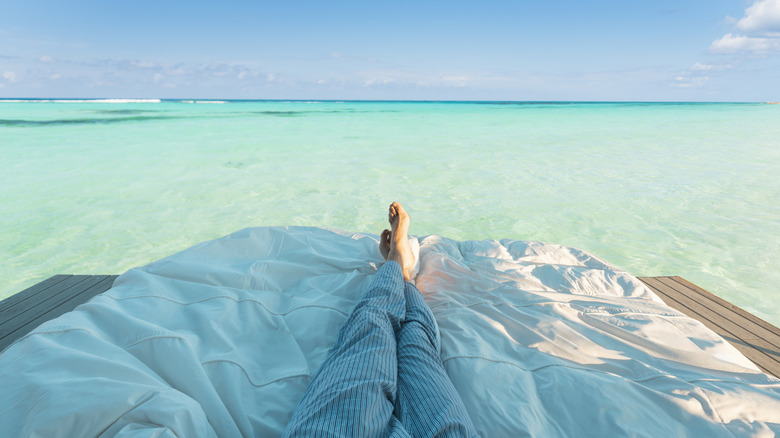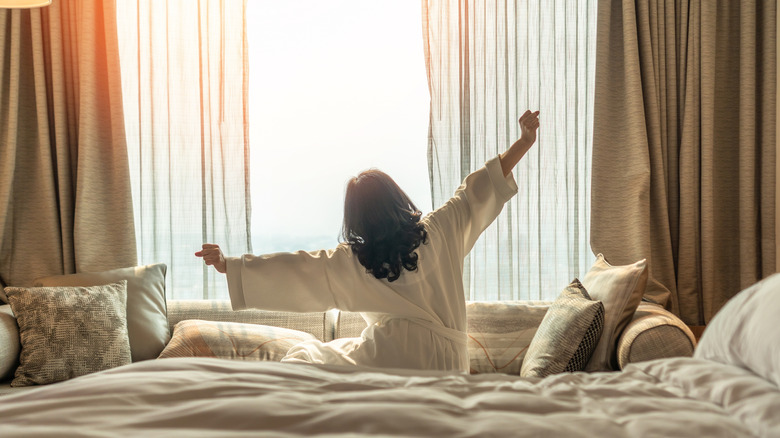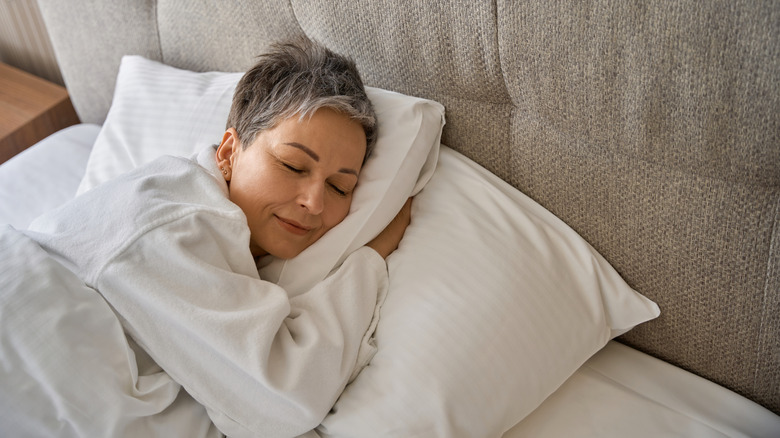This Health And Wellness Trend Offers Tourists A Relaxing And Restorative Getaway
We may receive a commission on purchases made from links.
At first glance this travel trend may sound like a prank. In the frenetic age of fast-paced travel and bucket-list itineraries, who wants to embark on a journey just to ... sleep? Yet in recent years, sleep tourism has emerged as one of the most sought-after trends in health and wellness travel, capturing the attention of weary folks desperately in need of rest and restoration, which is the vast majority. According to the US Army, two out of three adults get less than the recommended seven to eight hours of shut-eye.
In a passage of his book "Why We Sleep," neuroscientist Matthew Walker writes that "Scientists have discovered a revolutionary new treatment that makes you live longer. It enhances your memory, makes you more attractive. It keeps you slim and lowers food cravings. It protects you from cancer and dementia. It wards off colds and flu. It lowers your risk of heart attacks and stroke, not to mention diabetes. You'll even feel happier, less depressed, and less anxious. Are you interested?"
In a world that never stops moving, where productivity is key and screens take over every waking moment, the sleep tourism trend is gathering pace. Move over, Birkin bag; the new luxury accessory is a good night's rest. Instead of being a pause in between bouts of sightseeing, sleep itself is now the destination. Hotels and resorts are paying attention to this need and creating sanctuaries of rest, crafting rooms that optimize every element, from circadian lighting to advanced soundproofing and mattresses designed by neuroscientists.
Where to book a relaxing and restorative sleep getaway
In the words of F. Scott Fitzgerald, "The worst thing in the world is to try to sleep and not to." But there is good news for the sleep-deprived traveler. In the study "Sleep during travel balances individual sleep needs," authors Sigga Svala Jonasdottir, James Bagrow, and Sune Lehmann found that "Underslept individuals typically sleep more during travel than when at home, while individuals who average more than 7.5 hours of sleep at home typically sleep less when travelling." So it's time to focus on rejuvenation next time you get on the road — sleep tourism could be the antidote to exhausting vacation plans.
Here are a few luxury accommodation options for your next sleep-centered vacation in the U.S. or Europe, though restfulness comes at a price — the suites at these locations often run upwards of $1,000 per night. The Park Hyatt Chicago offers "Wellbeing" and "Mindfulness" suites, featuring yoga accessories, state-of-the-art gym equipment, luxury amenities such as essential oils and a sound machine, a spa-style bathroom, and the pièce de résistance: a smart bed that adjusts to your sleeping preferences and conforms to any pressure points and also delivers data on your sleep the morning after, if you care to track your performance. Across the Atlantic in northern Germany, the Lasenhof longevity clinic offers a seven-day "Sleep Well" program on the stunning Frisian Island of Sylt. After a full assessment of your habits, the experts draw up a therapy menu for the week, specifically designed to help you rekindle your love affair with Morpheus, the Greek god of dreams.
Planning a health and wellness sleep retreat
Before you commit to this major investment in your health, make sure that a particular sleep tourism destination fits your needs, personality, and budget. Check the facilities and amenities they offer. A remote location in the mountains or near the ocean may have built-in serenity due to its seclusion. But in a city, you'll want a room that minimizes noise and distractions. Ascertain that the sleep specialists on staff are qualified to provide guidance, or at a minimum, that the recommended setup has been designed by experts, with sleep quality as their main focus.
Plan some activities during the day, as exercise is an essential element to good sleep. But also avoid scheduling every moment of your trip so as to remain flexible and relaxed. Finally, don't hesitate to bring some familiar creature comforts, like your favorite pajamas or silk pillowcase, and start focusing on reducing pre-tip travel stress even before you leave home
But what if your budget doesn't stretch to a luxury sleep suite in an expensive resort? You can transform any trip into a sleep retreat by borrowing science-backed strategies from sleep tourism and wellness experts. Head therapist Antony Sadis of the Six Senses Spa at the Alpina Hotel Gstaad, Switzerland shared a few things to add to any travel itinerary to enhance sleep: keep a steady sleep routine as much as possible, avoid caffeine towards the end of the day, and schedule a 30-minute mindfulness walk every day. For a great head start, get some good safe sleep on the plane to credit some zzzz's in your sleep bank.


